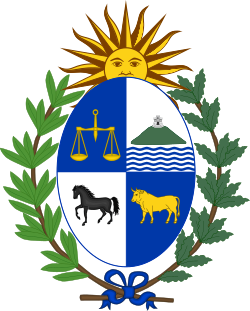Uruguayan nationality law
Uruguayan nationality law is mostly based on the principle of Jus soli. Its rules are written in the Uruguayan Constitution in Section III, Chapter I. Dual Citizenship is permitted under Uruguayan law, and people who naturalise as Uruguayan citizens are not obligated to renounce their previous nationality.
| Uruguayan Citizenship Act | |
|---|---|
 | |
| Parliament of Uruguay | |
Long title
| |
| Enacted by | Government of Uruguay |
| Status: Current legislation | |
Types of citizenship
In Uruguay, there is a distinction between natural and legal citizenship, similar to the United States.[1]
Natural citizens
Any person born in Uruguay acquires Uruguayan natural citizenship at birth.
- Any child of a Uruguayan citizen is a citizen of Uruguay, however they will only be categorised as a natural citizen if they were born within the territory of the republic.
Legal citizens
A legal citizen is someone who obtained citizenship after birth. In this case, a language examination is necessary in order to ensure the person knows Spanish. One can obtain the Uruguayan citizenship in three different ways:
- After investing a large sum of money in Uruguay or making an important contribution to science, art, or industry of Uruguay and after 3 years of residence in the country.
- A spouse of an Uruguayan citizen has the right of residence in Uruguay, and after five years of residence, it is possible for them to apply for citizenship.
- By grant of the General Assembly of Uruguay to a person who has made a noteworthy contribution to Uruguay or has excellent merits.
Legal citizens are not able to obtain the Uruguayan nationality.
